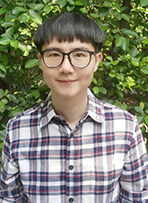DECHA DECHTRIRAT, Assistant Professor
 |
email: | fscidcd@ku.ac.th |
| Education: | B.Sc.(Chemistry) Kasetsart University, Thailand. M.Sc.(Chemistry) Freie Universitaet Berlin, Germany, Dr. rer. nat. (Bioanalytical Chemistry), Universitaet Potsdam, Germany |
|
| Research interests: | Biosensors, Bioanalysis, Bio-based materials, Biomimetic materials, Functional materials, Nanocomposites, Carbon materials |
We are currently working on a diverse range of topics concerning synthesis, characterization and applications of functional materials including
1) Bio-based materials containing bioactive plant extracts with antimicrobial, anti-inflammatory, antioxidant activity as wound dressings, scaffolds for tissue engineering and active food packaging
2) Nanomaterials in printable electrochemical sensors, test strips and naked eyes colorimetric analysis for selective detection of food contaminants (e.g., hormones, antibiotics, pesticides, mycotoxins, foodborne pathogens) and biomarkers in cancer, cardiovascular, immunological and infectious diseases
3) Magnetic carbon adsorbents from biomass (i.e., sugarcane bagasse, water hyacinth, oil palm shell) for waste water remediation with simple separation using an external magnet after completed decontamination process
4) Carbon based materials from biomass for sensor and energy storage
5) Moleculary imprinted polymers (MIPs) for chiral separation, selective enrichment/extraction of active compounds from natural products, environmental monitoring and waste treatment
Selected Publications
1. Green and sustainable zero-waste conversion of water hyacinth (Eichhornia crassipes) into superior magnetic carbon composite adsorbents and supercapacitor electrodes, A. Saning, S. Herou, D. Dechtrirat, C. Ieosakulrat, P. Pakawatpanurut, S. Kaowphong, C. Thanachayanont, M-M. Titirici, L. Chuenchom, RSC Advances, 2019, 9(42), 24248-24258.
2. Moisture-resistant electrospun polymer membranes for efficient and stable fully printable perovskite solar cells prepared in humid air, P. Prajongtat, C. Sriprachuabwong, R. Wongkanya, D. Dechtrirat, J. Sudchanham, N. Srisamran, W. Sangthong, P. Chuysinuan, A. Tuantranont, S. Hannongbua, N. Chattham, ACS Applied Materials & Interfaces, 2019, 11(31), 27677-27685.
3. A screen-printed carbon electrode modified with gold nanoparticles, poly(3,4-ethylenedioxythiophene), poly(styrene sulfonate) and a molecular imprint for voltammetric determination of nitrofurantoin, D. Dechtrirat, P. Yingyuad, P. Prajongtat, L. Chuenchom, C. Sriprachuabwong, A. Tuantranont, I-M. Tang, Microchimica Acta, 2018, 185(5), 261.
4. A facile one-pot green synthesis of gold nanoparticle-graphene-PEDOT: PSS nanocomposite for selective electrochemical detection of dopamine, P. Pananon, C. Sriprachuabwong, A. Wisitsoraat, P. Chuysinuan, A. Tuantranont, P. Saparpakorn, D. Dechtrirat, RSC Advances, 2018, 8(23), 12724-12732.
5. An electrochemical MIP sensor for selective detection of salbutamol based on a graphene/PEDOT: PSS modified screen printed carbon electrode, D. Dechtrirat, B. Sookcharoenpinyo, P. Prajongtat, C. Sriprachuabwong, A. Sanguankiat, A. Tuantranont, S. Hannongbua, RSC Advances, 2018, 8(1), 206-212.
6. Vectorially imprinted hybrid nanofilm for acetylcholinesterase recognition, K. J. Jetzschmann, G. Jágerszki, D. Dechtrirat, A. Yarman, N. Gajovic‐Eichelmann, H‐D. Gilsing, B. Schulz, R. E. Gyurcsányi, F. W. Scheller, Advanced Functional Materials, 2015, 25(32), 5178-5183.
7. Cytochrome c‐derived hybrid systems based on moleculary imprinted polymers, A. Yarman, D. Dechtrirat, M. Bosserdt, K. J. Jetzschmann, N. Gajovic‐Eichelmann, F. W. Scheller, Electroanalysis, 2015, 27(3), 573-586.
8. Hybrid material for protein sensing based on electrosynthesized MIP on a mannose terminated SAM, D. Dechtrirat, N. Gajovic-Eichelmann, F. F. Bier, F. W. Scheller, Advanced Functional Materials, 2014, 24(15), 2233-2239.
9. Electrochemical displacement sensor based on ferrocene boronic acid tracer and immobilized glycan for saccharide binding proteins and E.coli, D. Dechtrirat, N. Gajovic-Eichelmann, F. Wojcik, L. Hartmann, F. F. Bier, F. W. Scheller, Biosensors and Bioelectronics, 2014, 58, 1-8.
10. Protein rebinding to surface confined imprint, D. Dechtrirat, K. J. Jetzschmann, W. F. M. Stöcklein, F. W. Scheller, N. GajovicEichelmann, Advanced Functional Materials, 2012, 22(24), 5231-5237.

